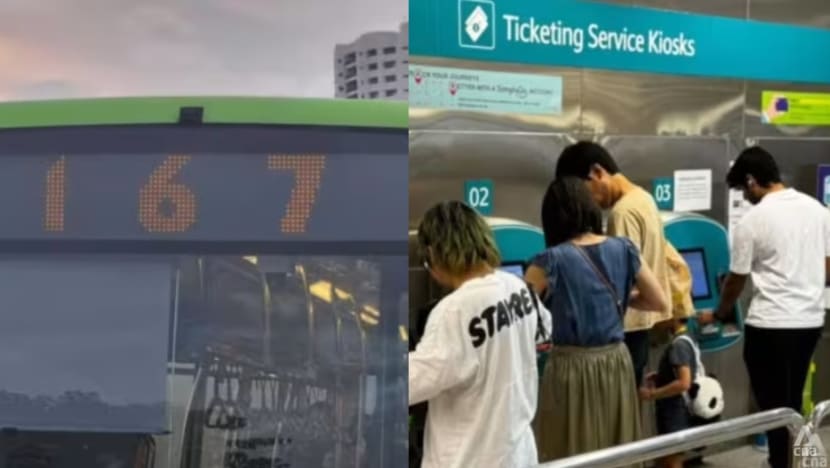Commentary: The politics of reversal, does it signal a new approach for the 4G leadership?
That two publicly announced transport decisions were reversed in the span of two months is interesting, taking place ahead of Singapore's leadership transition, says former LTA board member and newspaper editor Han Fook Kwang.

File photos of bus service 167 and EZ-Link ticketing kiosks.

This audio is generated by an AI tool.
SINGAPORE: Reversing publicly announced decisions twice in the span of two months is highly unusual by Singapore government standards.
It is known, after all, for being rigorous in planning and anticipating problems that might crop up.
The first reversal in late November last year involved the termination of bus service 167, while the latest, earlier this week, came two weeks after the announcement that EZ-Link fare cards for public transport would be phased out in favour of the newer SimplyGo ones.
But many commuters said they preferred the older cards because they were able to see the fares being deducted when they exit MRT stations and buses, but not with SimplyGo. It was a deal breaker for them, and they made known their unhappiness on social media.
Transport Minister Chee Hong Tat in announcing the reversal, said he heard the complaints and apologised for the shortcomings in the preparations leading up to the change, as well as for an "error of judgement". He also said that retaining the older system would cost the government an extra S$40 million, which will be used to buy new hardware, as well as to maintain and operate the older ticketing system.
What prompted this change of heart?
Was it a case that the original transition plan wasn’t well thought through and turned out to be a bummer in the face of sharply negative public reaction, which wasn’t anticipated? Or did the Land Transport Authority (LTA) not anticipate how uptight commuters would be about not knowing how much was deducted from their card after each trip?
CHANGE IN POSITION SUDDEN AND SURPRISING
I do not think that it is so straightforward, even though the LTA did indeed fail in its communications to the public.
The original idea to phase out EZ-Link cards would have been approved at the highest level of government as it involved large numbers of commuters, and would hence be deemed as politically sensitive.
It is not hard to imagine the arguments put out in favour of going the SimplyGo way: It was in line with most payment systems linked to your bank or credit card account, doing away with having two different systems that would be costly to maintain.
In other words, it was where the future lay.
It is also not hard to imagine voices in government arguing against the reversal - bear with the public unhappiness for a couple of weeks, and come June when the change happens, most would get used to the new system, even if grudgingly.
Yet, the outcome was an apology from the minister and a reversal.
Why?
Which brings me back to the earlier reversal in November last year, which, amid the furore over SimplyGo, has largely been forgotten.
When the LTA announced that bus service 167 from Sembawang to Bukit Merah would be terminated, many commuters must have thought that was it - time to look for alternative bus and MRT services.
The authorities said that with the completion of the Thomson-East Coast Line, passenger numbers on bus 167 had fallen by up to 40 per cent and that it was no longer financially feasible to continue with the service. There were the usual protests from affected commuters and an online petition gathered 760 signatures.
But it was no different from other instances in the past when bus services were withdrawn or changed for the same reason: As the MRT network expands, some services will become less used as commuters switch to trains.
So, end of story?
But this one had a different ending. On Nov 28, the LTA announced it would not withdraw the service after all but would instead reduce its frequency.
The change in position was as sudden as it was surprising.
What to make of these two reversals?
There are several similarities worth noting. Both were said to be necessary to take into account new developments - the growing popularity of SimplyGo cards and the increased cost of maintaining an older system, and the expanding MRT network which duplicates some bus routes.
Both claimed to benefit the wider public in the long term from cost savings even if some people might be worse off.
The Singapore public is nothing if not accustomed to being asked to think community before self.
So, why the change from the original plans?
GREATER WILLINGNESS TO CHANGE
I think the answer lies only partly in the merits or otherwise of each of these changes. You could argue the pros and cons either way.
What may have been more decisive is the political attitude of the government in being more willing to change and take into account public feedback.
Are Singaporeans seeing signs of a government that is not intent on sticking to its guns - regardless of public sentiment - because it knows best?
The timing of these two reversals is interesting, taking place ahead of a leadership transition as the old guard makes way for the new 4G leadership, with Deputy Prime Minister Lawrence Wong set to take over the mantle from Prime Minister Lee Hsien Loong this year.
With an election due by next year, Singaporeans are likely to hear in the coming months what the new team stands for and how it plans to tackle prickly issues.
Could part of the message be a government that listens to the ground more attentively?
In his speech at the party conference in November last year, this was how the PM-designate put it:
"I don't start with the assumption that I know everything or have the answers to all problems because I certainly don't," said Mr Wong.
"Instead, I'd prefer to start by listening, hearing a diverse range of perspectives and views and staying open to different ideas. In the end, I will have to decide.”
The message from the ground over SimplyGo was loud and clear, and if Mr Wong wanted people to take his new approach seriously, the government had to act.
SimplyGo had to go.
But don’t expect the new team to suddenly become reactive or populist in the months ahead. It will not want to look weak nor indecisive.
So, how to balance the two extremes?
On fundamental policy issues such as the recent hike in the Goods and Services Tax (GST) to 9 per cent, it has stuck to its plans despite public protests.
Ditto in the fight against corruption.
But there is some room to do more in other areas and to accommodate other voices in less core areas.
When the government is firm on issues it feels are important enough to take a stand on regardless of the political cost, it perhaps becomes slightly easier to respond on those issues where the stakes are not so high - without appearing populist.
Expect more give and take as the new team settles in.
Han Fook Kwang is currently a senior fellow at the S Rajaratnam School of International Studies, Nanyang Technological University. He was a former board member of the Land Transport Authority and a former veteran newspaper editor.
















